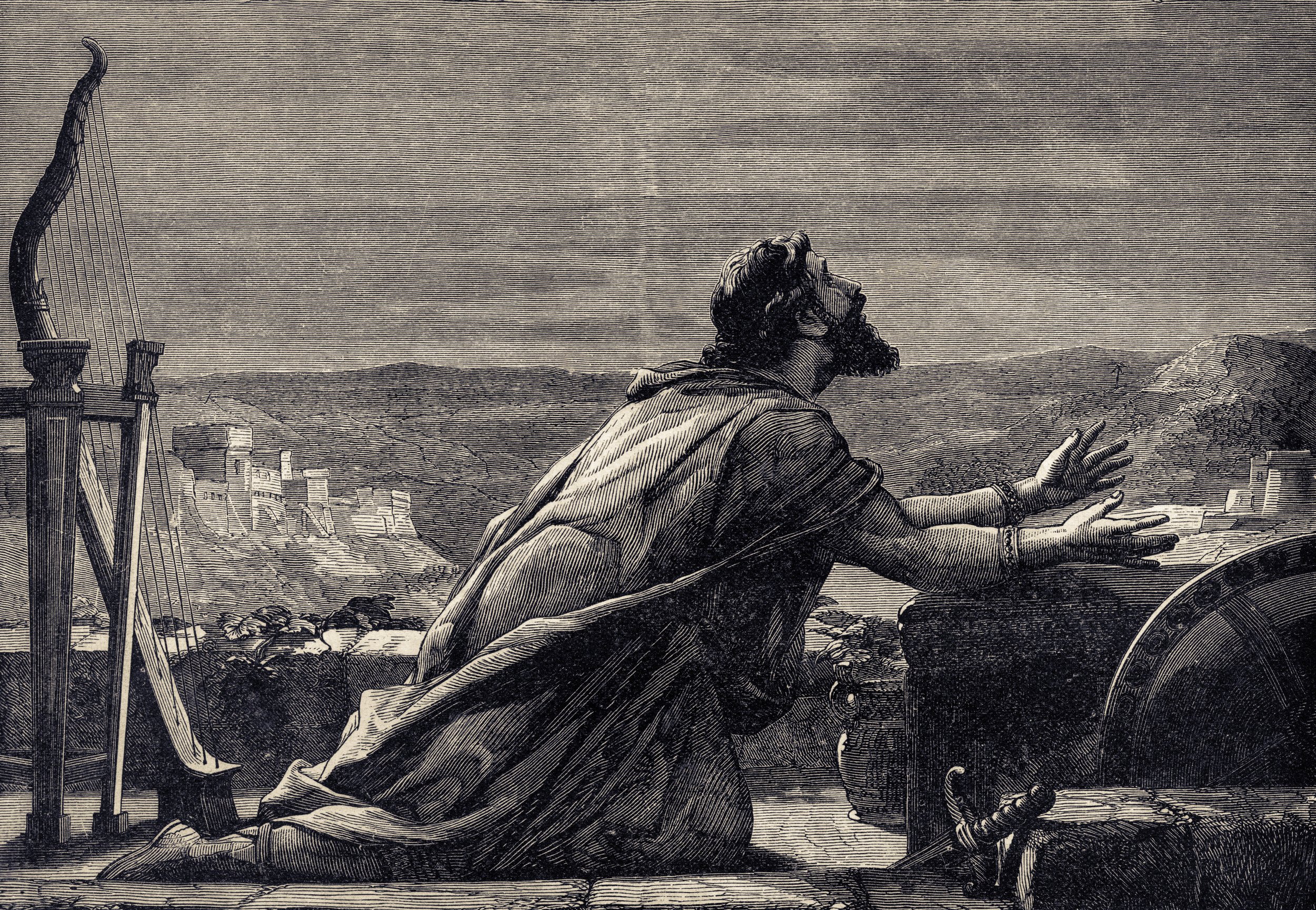Reflections on Psalms 22, 23, and 24
Written by David W. Hegg | Senior Pastor
This trio of Psalms, all from the mind, heart, and pen of Israel’s King David, has long been seen as summarizing the redemptive ministry of our Messiah, God the Son Incarnate. The themes of these three psalms are often labeled in this way: The Cross (Ps. 22), The (Shepherd’s) Crook (Ps. 23), and The Crown (Ps. 24) signifying Christ’s redemptive work as the Redeemer who died, the Shepherd who leads, and the King of Glory who rules over all.
Psalm 22: The Cross
As Jesus of Nazareth hung on a Roman cross, he cried out with a loud voice, saying, … My God, my God, why have you forsaken me? (Matthew 27:46). In reality, he was not suggesting that the nature of God had somehow been rent asunder. He was simply calling out the first line of Psalm 22 in order for those nearby to understand that what they were witnessing had not taken God by surprise. Rather, Jesus was referring them to a psalm, written hundreds of years before, in which much of what he had already experienced on the cross was sovereignly described.
Take notice of these lines in this psalm:
(vs. 1) My God, my God, why have you forsaken me? … (vs. 7) All who see me mock me; they make mouths at me; they wag their heads; “He trusts in the Lord; let him deliver him.” (vs. 14) I am poured out like water, and all my bones are out of joint; my heart is like wax; it is melted within my breast; (vs. 15) my strength is dried up like a potsherd and my tongue sticks to my jaws; you lay me in the dust of death … (vs. 16) … they have pierced my hands and feet … (vs. 18) they divide my garments among them, and for my clothing they cast lots.
Yet, despite the suffering portrayed, the remainder of the psalm describes the end result: (vs. 27) All the ends of the earth shall remember and turn to the Lord and all the families of the nations shall worship you, (vs. 28) for kingship belongs to the Lord, and he rules over the nations.
And, at the end of the psalm, we find some words which sound eerily like Jesus’ last words on the cross: (vs. 3) They shall come and proclaim … that he has done it. Could it be that he has done it became it is finished?
We can’t be certain, but what is all too clear is that David, in writing this psalm, wrote beyond what he knew when he described his own suffering. Under the superintendency of God the Spirit, David penned a psalm that, while poignantly detailing his own pain and despair, also testified to those standing beneath the cross that all Jesus was enduring had been foretold long before. Jesus was simply pointing out that the cross was not the end of his redemptive efforts as some thought and Satan hoped. Rather, it was the master stroke of grace and truth that guaranteed our forgiveness and adoption into the family of God. When the grave was empty, it became clear that the cross of Christ was our Statue of Liberty!
Psalm 23: The Crook
The six verses of Psalm 23 move us from the Cross to the Shepherd’s Crook and make up one of the most beloved and comforting texts in the Bible. Again, it is important to understand that the author is King David. As he wrote, he was the most powerful person in a vast realm. He had thousands of subjects and hundreds of servants to do his bidding. Of all those who might admit to needing a shepherd, a guide, a provider, and protector, we might guess that David was not one of them! But, in his own simple words, he tells us three important truths:
“I need a shepherd. Not just any shepherd will do. I need the Lord to be my shepherd!”
I’m sure you’ve heard Psalm 23 taught many times. You’ve certainly read it often and perhaps even memorized it. Given that it is so well known, my task here is to lift the veil of familiarity so you can hear its message as though for the first time and have your heart and mind lifted up in praise and thankfulness to the Lord, the Shepherd of your soul.
Psalm 23 consists of three sections. Think of each section as David’s musing about a formative period in his life.
Section one (vs. 1-3) has David remembering his own early years as a shepherd. And as he remembers the skills necessary to provide everything his sheep needed, he understands more fully just how much the Lord cares for him. He cares for him physically in the best pastures, emotionally in restoring his soul, and spiritually as the One who leads him in the paths of righteousness. In a world of great temptations and selfish options, the Lord leads him through the options this world offers, and all David has to do is follow! It is clear that, for David and for every Christ-follower, obedience to Christ our Shepherd — following where he leads! — is the highest form of worship.
Section two (vs. 4) finds David remembering that season of life when he was being chased by Saul and other enemies when his every day was one of danger and great fear. He remembers that, even in the most desperate times, his faith in the Lord was a great refuge for his soul. In times of trouble, his Shepherd did not desert him. Rather, he was there with his shepherd’s crook.
David also reminds us that if we are following the Lord as our Shepherd, at times, we may find ourselves in the valley of adversity. Why? Because there are things the Lord wants to teach us through hard times that we can’t learn any other way. And yet, he is always there with his love, strength, and unbounded grace.
Section three (vs. 5,6) speaks both to David’s prosperous years and his glorious future. The picture turns from the Shepherd and his sheep to a banquet host and his guests. The Lord has been so good to David. He has sumptuously provided for David and honored him among the people. David is overwhelmed with the bounty of God’s unmerited grace that has followed him all through his life. And yet, he is not only hopeful but exceedingly confident that the best, the fullness of God’s goodness toward him, is yet to come! Perhaps the most precious promise in the Bible ends this beautiful psalm: And I shall dwell in the house of the Lord forever!
Psalm 24 The Crown
The promise of actually living with the Lord forever, as Psalm 23 emphatically states, is even more awe-inspiring when we realize that the Lord is the King of all creation. He wears a crown that is both one-of-a-kind and unable to be worn by any other being since he alone is the source of all that is. (vs. 1) The earth is the Lord’s and the fullness thereof, the world and those who dwell therein.
But in vs. 3, David asks the greatest question of all: Who shall ascend to the hill of the Lord? And who shall stand in his holy place? This is a question David often asked in his psalms (see Psalm 15), but it is not one to which David has no answer. This question is simply his way of introducing the truth that not just anyone gets to be in the presence of Almighty God. In fact, it is only those whom God himself draws near to him. It has always been that way, and God the Son declared it clearly when, in after feeding the 5000, Jesus proclaimed, All that the Father gives me will come to me, and whoever comes to me I will never cast out … No one can come to me unless the Father who sent me draws him. And I will raise him up on the last day (John 6:37, 44).
And how does David describe those who have been drawn near to God? What are the distinguishing traits of those whom God the Father has brought into his saving presence? David confirms that the saving grace of God not only rescues but also transforms lives. Through saving faith in God’s promises to us in Jesus Christ, we become new creations – a new kind of humanity – no longer in bondage to sin, but rather fully forgiven, indwelt by God the Spirit, and now able to be vessels of honor, set apart as holy, useful to the master, and ready for every good work (2 Timothy 2:20,21).
And how is the Lord able to do all this?
“David’s final reminder is that the One who died for us on the Cross and wields the Shepherd’s Crook on our behalf is also the One and only King of Glory!”
And who is this King of Glory? The Lord, strong and mighty, the Lord mighty in battle! … the Lord of hosts, he is the King of Glory!
And dear friend and fellow Christ-follower … The Lord is our King! Let us then strive with all our heart, soul, mind, and strength to walk in a manner worthy of God who calls you into his own Kingdom and glory! (1 Thessalonians 2:12).

